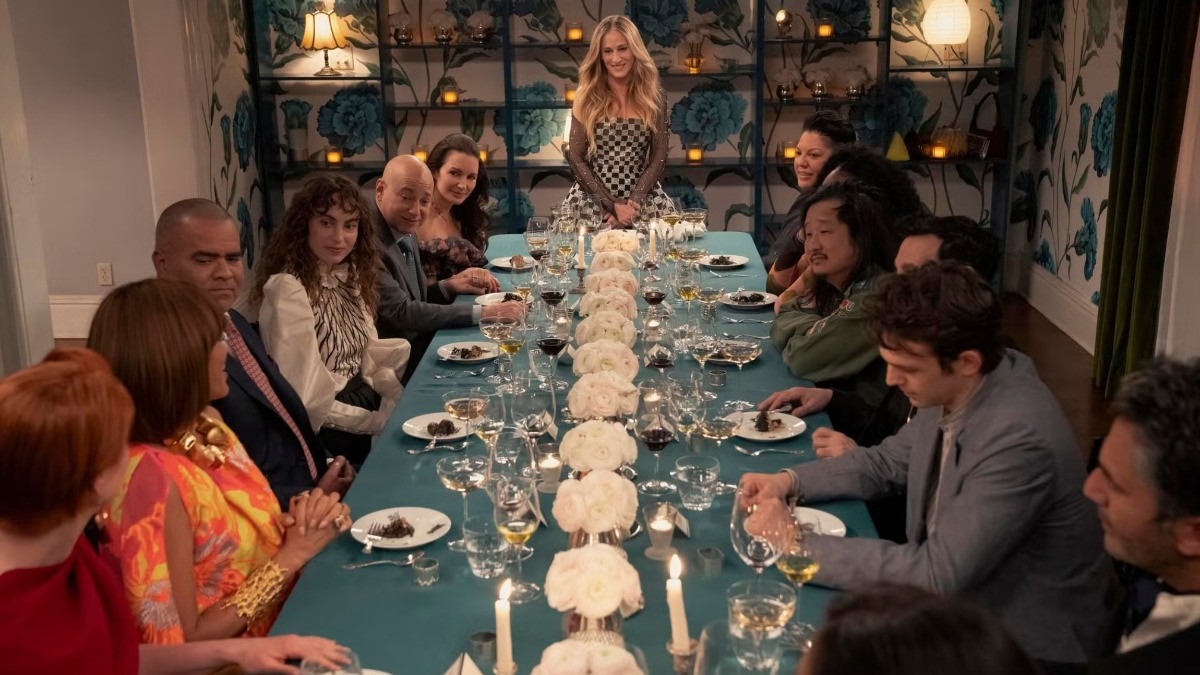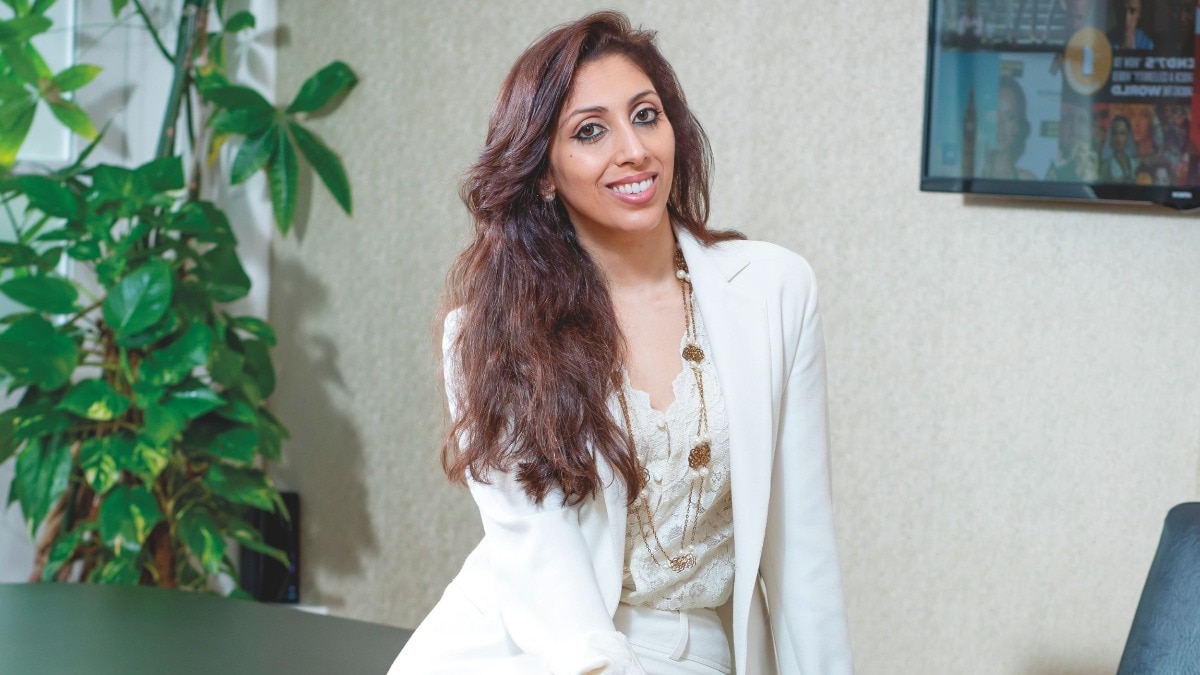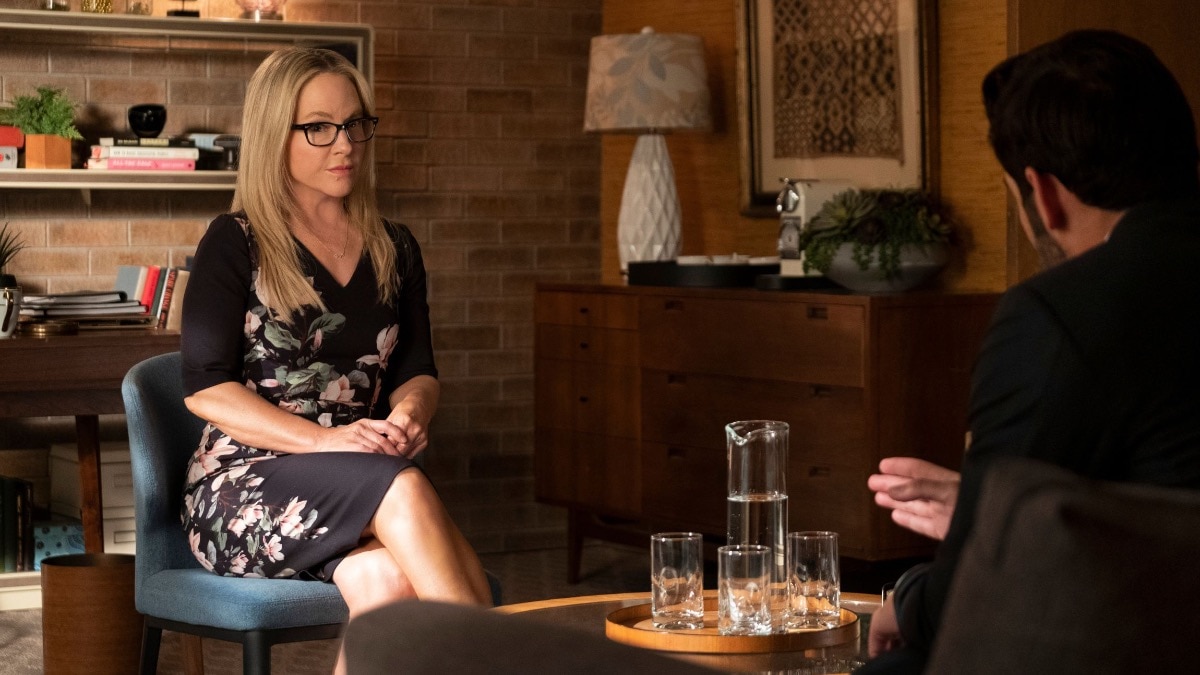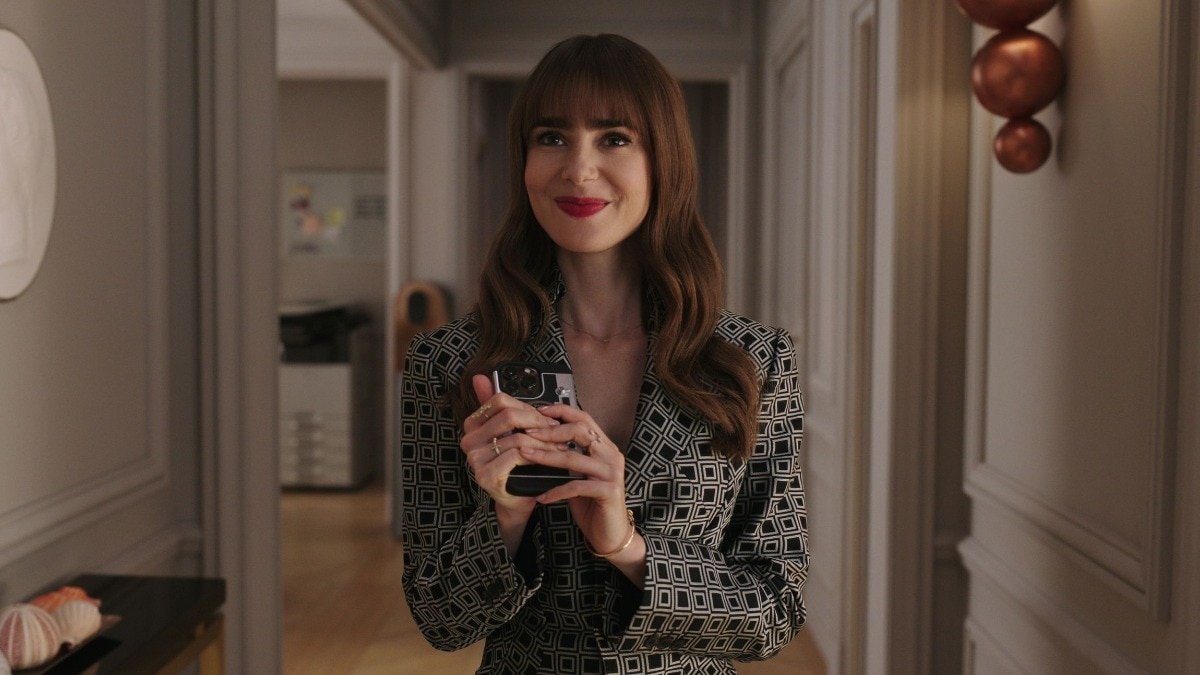
Luke Thompson opens up about filming Bridgerton’s sexiest scene yet
“Sex, or anything approaching sex, is just a very condensed version of a conversation,” the actor tells Bazaar.


Luke Thompson admits he doesn’t quite know what to make of Benedict Bridgerton’s purpose in life.
For three seasons on Netflix’s Regency-era romantic drama Bridgerton, Thompson has brought a charming mix of heart and humour to the role of the second-born son of a well-to-do, aristocratic family, whose position as the so-called spare to the heir (older brother Viscount Anthony Bridgerton, played by Jonathan Bailey) has left him with a lack of responsibility. But that considerable freedom is as much a blessing as it is a curse; over the years, Benedict has experimented—with art, with women, with opium—in search of his true calling in life.
“What’s interesting with Benedict is that he’s very competent at a lot of things. The struggle is more inner,” Thompson tells Harper’s Bazaar on a recent Friday afternoon in New York City. “The problem is more like: What does he want to do? Where does he want to go? He’s socially adept at doing the whole ton thing; he’s actually good at it. It’s just that he’s not quite sure if that’s what he wants.”
Benedict opens himself up to a new world of pleasure in the second half of the new season, which premiered Thursday. After introducing his family to Lady Tilley Arnold (Hannah New), a widow whose shrewd, intelligent nature catches his attention in the third episode, Benedict agrees to have dinner with Tilley’s close friend, Paul Suarez (Lucas Aurelio). What Benedict initially fails to realize is that the dinner party of three is really an invitation to be part of a ménage à trois. While he may have flirted with the idea of being intimate with another man in the past, Benedict has never acted on those feelings, but his curiosity gets the better of him in the season’s final two episodes.
Throughout our conversation, Thompson repeatedly insists he does not know whether he will play the male lead in the fourth season of Bridgerton. The identity of the next Bridgerton to take center stage remains one of the show’s biggest question marks: Showrunner Jess Brownell has already passed over Benedict’s love story with Sophie Beckett once to bring the relationship between Colin (Luke Newton) and Penelope (Nicola Coughlan) to a head. And now with the introduction of Michaela Sterling (Masali Baduza), the cousin of Francesca’s (Hannah Dodd) new husband, John (Victor Alli), the writers appear to be planting the seeds to adapt Francesca’s story in a way that may shock even longtime readers of the Julia Quinn novels the show is based on. (In the books, John’s cousin is a man, Michael.)
For his part, as long as he gets to keep peeling back the layers on Benedict, Thompson—who cut his teeth primarily as a theater actor in the U.K. and has starred in stage productions of A Little Life and Love’s Labour’s Lost between filming seasons of Bridgerton—is happy to wait his turn and go wherever the writing takes him.
Below, the actor reflects on Benedict’s big revelation (which some viewers may argue was a long time coming); the difficult but necessary separation of the Bridgerton family at the end of the season; and the one moment from Benedict’s book, An Offer From a Gentleman, he is most excited to bring to life onscreen in the future.
What did Benedict’s arc in the second half of this season help you unlock in terms of your understanding of him as a character?
It’s a continuation of what he’s been doing since season one. There’s a really lovely spirit in Benedict of exploration and curiosity without the angst that is often associated with sexuality—and particularly sexual identity. I think it’s actually really refreshing and quite striking to watch a character, particularly a male character, exploring those things with a sense of “Who knows? Why not?” and without the anxiety about necessarily putting a label on it. Funnily enough, it is probably also closer to the original period. Obviously, let’s not pretend that (the Regency era) wasn’t an incredibly repressive period in terms of sex. But I do also think that in that period, sex was sex, and the idea of identity is maybe a more new concept. So it’s just really lovely to watch someone explore that in terms of gender and sex, but with two other people at the same time.
What have you made of the growing speculation about Benedict’s sexuality from the first season until now? Did you notice in the playing of the character early on that he could have that additional layer to him?
I think it really delves into the fact that our feelings—particularly when it comes to sex or desire, but even more generally—there really is a spectrum, and there really is a tipping point. Particularly with a character like Benedict, I don’t think you can operate on a logic of “They are [queer] or they aren’t.” They are up to a point, but maybe at that point, it’s not quite enough [to act upon that desire]. The only word I can think of is how subtle desire is.
I think back to (Benedict’s) friendship with (artist) Henry Granville (in season one)—was something there, and who knows what it was? Could it have turned into something more? And then it just didn’t (happen), because it wasn’t quite enough, or he wasn’t quite ready, or whatever. So I think what’s really interesting about exploring that character is (to show) how our desires are shifting. In terms of Tilley and Paul, Benedict is attracted to their way of thinking. The way that they see the world and that they position themselves is attractive and alluring to him, (regardless of) whether it’s a man or woman.
What kinds of considerations did you have in mind when approaching the progression of the intimacy that Benedict feels with Tilley and Paul together?
With any acting process, it’s all to do with trust—not just in terms of trusting each other, but trusting the little moments that’ll happen. I think filming a sex scene is no different from filming a dance scene, actually, and particularly now with intimacy coordinators as well, it really feels like it is just another way of telling the story. I think sex, or anything approaching sex, is just a very condensed version of a conversation; it’s incredibly revealing. [Sex scenes] are incredibly rich moments that can really open up so much about characters. There’s been this anxiety and problem around them—and understandably so—and now, you have an environment where you can really take them apart and think of them as part of the process of exploring a character.
What do you think can be revealed, then, in Benedict’s threesome scenes with Tilley and Paul?
God, it’s so difficult for me to narrow it down, because fundamentally, that’s why I think they’re such interesting scenes. It’s such a cliché to say an action speaks a thousand words, but I think all those scenes are simultaneously revealing but also very ambiguous. I think that’s what makes them really fun and hopefully interesting and mesmerizing to watch—you are sort of like, “What is going on?” I think to even try and name it is to defeat the point of those scenes, because even when people are speaking words, we’re still not quite sure what exactly a character is meaning. But when it’s just physicality, it’s even more ambiguous and revealing.
So you would rather leave it open to interpretation?
Exactly.

In the finale, Tilley tells Benedict that she has begun to have feelings for him and no longer wants to share him with anyone else, but Benedict essentially says he isn’t ready to settle down yet. Where do you think we leave Benedict at the end of the season?
I think he’s left in a very confronting place; the final scene with Tilley has really left him with something that hasn’t been expressed to him before in quite those terms. There’s always been this drive with Benedict to explore, to just be free and never settle, or never make a choice. Freedom is great, but there are limits to freedom. I think as you get older, particularly as you mature, you realize that when you’re young, you think that’s all there is: “I just want to keep exploring.” And all Tilley is pointing out is that there is also value, excitement, and thrill in making a choice and actually going beyond that.
What I find so deeply relatable about this show is this idea (that) you grow up in this family where you know who you are and how you relate to everyone within that structure, and then you have to exit and find out who you are outside of that structure. There’s something quite poignant about this very tightly knit family who’ve grown up together and have this real closeness now having (to separate at the end of season three).
Eloise obviously loves Colin and jokes that Gregory (Will Tilston) is her favorite brother, but I actually think she is closest with Benedict.
I love that scene when she says that (Gregory is her favourite). You’re right—there is that closeness. There is this beautiful thing that they have together, and yet they do get to a point where you think, by being on the peripherals together and deciding that you’re not going to play that game, are you standing in each other’s way in some kind of strange way? And I think that’s really relatable.
It always makes me think of that scene (in episode 7) where Benedict says to Eloise in a very nice way: “Love isn’t finite.” And that’s true to some extent, but I also think the opposite is true. I think our emotional bandwidth is limited, and you can’t have space for everyone. So I think particularly at the end of season three, there’s something really touching and a little melancholy about this brother and sister who are like, “Maybe somewhere, something’s going to have to give,” do you know what I mean? The family is growing up, and it’s not going to be like this forever.
Benedict has now watched two of his brothers—as well as two of his sisters—find love and settle down. What kind of impact do you think that will have on him going forward? Will he rethink his own approach to marriage?
I think it’s huge, but who knows whether it’ll actually make him do it. Someone said to me the other day that both Colin and Anthony have a sort of heartbreak, which is then the instigator (for them finding love in the next season). But with Benedict, what happened this season anyway—and going forward we’ll see it as well—at the moment it seems more that the struggle is not an outer thing, like a heartbreak. It’s actually in here (gestures toward something internal).
In an old interview, you said, in reference to Benedict: “What you hide is just as important as what you reveal.” But you could just as easily have been talking about yourself and the way you’ve navigated fame, which is, ultimately, a byproduct of the success of your work. How have you navigated that divide between deciding what you want to share publicly and what you want to keep for yourself? Is that something that you have discussed with your costars?
(I’ve spoken with them) a little bit. I think the thing is, though, as with acting itself, it’s so subjective, and people have a very different way of dealing with it [that] makes sense to them. To me, acting is a little bit like a magic trick. Whether or not it’s good or bad, it doesn’t really matter. It’s not really my business how good or bad it is, but it’s my magic trick. And if I start to draw out stuff from me as a person, I’m basically showing you how the trick is done on some level. In a way, it sort of feels like that, so it’s spoiling (the experience) for me.
Acting is such a freeing thing to do. It is where, in some ways, I feel happiest, so I need to protect that—not out of a sense of secrecy or privacy. It’s very specifically to do with the job—the job is to let people imagine stuff about you, and if you start giving huge chunks about yourself to people, they will surely eventually get in the way of what needs to happen, which is people need to be able to fantasise. That’s how it makes sense to me. But if you ask another actor, they would have an entirely different answer, because the experience of acting would feel totally different to them.

You’ve already read Benedict’s book, which may or may not be the source material for next season. What parts of that book would you be most excited to play and adapt for the screen?
I think Julia Quinn is always very good at finding these quintessentially Regency romance moments, so there are loads (that I want to adapt). There’s something about the way that she writes that in each novel, there are two or three cornerstone moments. So of course, if we get to the point where we really deep-dive into Benedict’s story, there will be times that I’m like, “It’d be really great if we could keep that,” but I’m also a great believer in leaving all of that to the writers.
Give me one of the cornerstones, then.
I like jumping in a lake. I hope I get to jump in a lake. That’d be fun.
This interview has been edited and condensed for length and clarity.
This article originally appeared in harpersbazaar.com/us in June 2024.
Feature image credits: Netflix
Also Read: The queer awakening of 'Bridgerton'
Also Read: Nicola Coughlan on 'Bridgerton', broken furniture, and what’s next for Lady Whistledown










